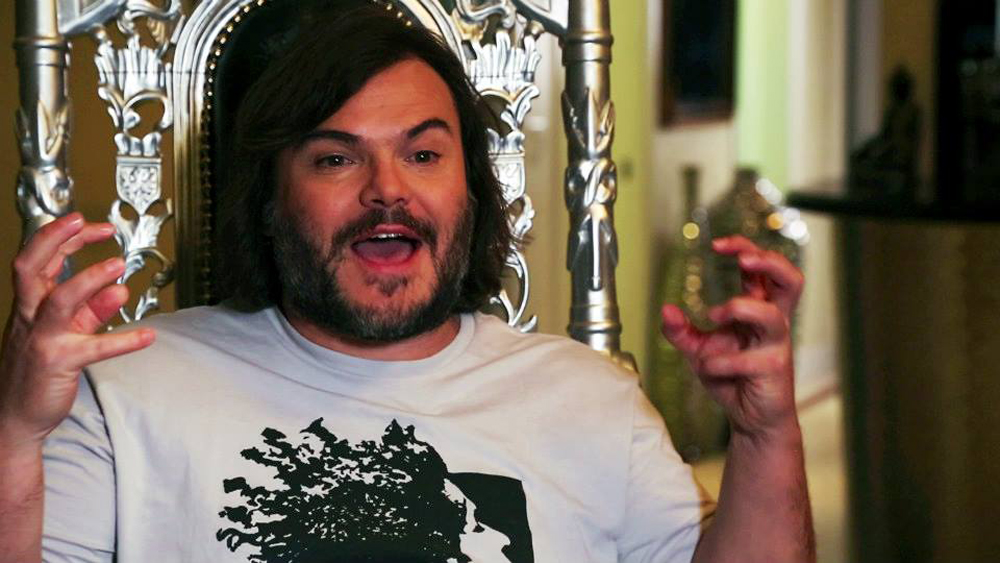At the beginning of “21 Years: Richard Linklater,” the writer/director of such varied films as “Dazed and Confused,” “A Scanner Darkly,” “School of Rock” and “Bernie” is quoted at the start as saying, “The truth will only be told over a career.” That likely makes Michael Dunaway and Tara Wood’s tribute to the filmmaker a bit premature for Linklater’s taste, but following so closely on the heels of the landmark achievements of completing the “Before” trilogy last year and this year’s “Boyhood,” “21 Years” serves as a timely appreciation of one of the world’s most idiosyncratic and humble directors, recruiting many of his close collaborators to share their recollections on working with him and muse on the meaning of his work. Making no secret of its position on Linklater, with a wave of profuse thank yous from the likes of Matthew McConaughey, Ethan Hawke, Billy Bob Thornton, and Jack Black accompanying the end credits, the movie is less a deep, analytical study of his diverse filmography than an entertaining primer that will have one wanting to have a stack of his films nearby to mainline shortly after it’s over.
It’s also the kind of career overview that will make fans of the filmmaker even bigger fans, something that happened to Dunaway, the film editor of Paste Magazine, and Wood, a sales agent and producer who knew Linklater from the set of “The Newton Boys,” during the making of it. When the two were both in Austin for SXSW in 2012, Dunaway was just about to do an interview with Kevin Smith when a conversation about how underappreciated Linklater was as an auteur and soon, they began plotting a way to change that. Not only do they celebrate Austin’s native son, but also the film community he helped cultivate in founding the Austin Film Society, which in keeping with Linklater’s generous spirit will see some of the proceeds from the streaming release of “21 Years” on the service Yekra. Just two weeks out from its debut in theaters and on VOD during the Austin Film Festival where the film made its world premiere, Dunaway and Wood spoke about how they put together a film that would reflect as eclectic a career as Linklater’s, how easy it is to get people to talk about such a beloved person and how they consider “21 Years” just the start of exciting things for the filmmaker and themselves.
How did this get started?
Michael Dunaway: The New Orleans Film Festival was doing a 20th anniversary screening of “Slacker” and my friend Jolene Pinder commissioned me to do a little tribute short to come before the film. When I interviewed Ethan Hawke for the short, I let slip that I was thinking about it as a feature and he got real animated and said, “You should definitely do make it a feature.” Buoyed by that, I moved on to the idea of a feature and then very, very early on in that process met up with Tara and brought her on as a partner.
Since it isn’t chronological and some of the chapters pair films together, how did the structure of the film come about?
Tara Wood: That was definitely a challenge. We tried to keep it linear, but starting with “Dazed and Confused” and ending with “Slacker” because of the way most people came to “Slacker.” The actors also shaped how we grouped them together. I thought “Bad News Bears” and “A Scanner Darkly” [were] brilliant [together] because of how “Bad News Bears” is perceived as well as what “A Scanner Darkly” is perceived to be and we put them together and they’re actually quite similar in many ways. “The Newton Boys”/“Bernie” section was Rick’s fascination with the criminal mind. The opening quote [of each of the chapters] gives you an idea of what those sections are and why they’re there. It does stay pretty linear.
Michael Dunaway: We really wanted to start out with “Dazed and Confused.” This whole thing is a gift to Rick and his fans. Let’s eat dessert first – the good, fun time stories that everybody has. Then we really wanted to end the movie with a look at Rick’s influence on Austin and Austin’s influence on him, so “Slacker” is just the natural way to do that. Really, the movie is a look at his entire career and there’s a certain full circle-ness that you end where your career began.
Tara mentioned the quotes and it’s remarkable how much Linklater has reflected on his own career. Did that make the job easier or harder in terms of finding just the right ones to introduce these specific points in his career?
Michael Dunaway: I give the credit to Tara, who did that research and came up with a list of about 40 quotes. We looked at what we thought would work best together and she really drove that process.
Tara Wood: Rick is not interviewed in the film, which was a decision we made so that the audience could learn about him through the eyes of the collaborators. That was a way of including his voice.
Was he aware of what you were up to while you were making this?
Tara Wood: Yeah, absolutely. He was on from the beginning when Michael started the New Orleans short.
Michael Dunaway: Actually, the first email I sent was to his people to say, “Hey, are you alright with me doing this tribute short?” They loved the idea, so we moved forward from there.
How did you decide who to interview who weren’t his collaborators?
Michael Dunaway: We wanted to talk to directors who we felt like had been influenced by Rick. We reached out to Jason Reitman, who said “yes” very quickly and he was one of our best interviews the whole film. He really had really introspective things to say about Rick’s influence on him and about film in general. We were so thrilled to have Jay and Mark Duplass come in because I feel like in the lineage of Rick, they’re obviously his children. You can really trace that influence and they’re brilliant filmmakers and such nice guys that it really adds a lot flavor. Then no film about Linklater that has directors talking in it would be complete without Kevin Smith telling his famous story of walking out of “Slacker” and saying, “I want to be a filmmaker.” Kevin’s a highly-scheduled guy and that took a lot of doing to get that set up, but we’re thrilled to have his story in the film as well.

Michael Dunaway: First of all, literally we didn’t get a no from anyone we contacted. There was no one who said, “No, we’re not interested in doing that.” There were some people that really wanted to do it, we wanted to get them, but we just couldn’t schedule it because they were so busy. Of the people that are in the movie, I’d say Matthew [McConaughey] was the one that was the hardest for our team and their team to figure out a time when we were all going to be in the same city, understandably so. Matthew was filming “Dallas Buyers Club,” then promoting “Dallas Buyers Club” and then he was, oh, I don’t know, winning an Oscar, so he had been doing huge, career changing things. Both sides were very diligent in saying this movie needs to have Matthew in it and we were finally able to sit down with him and boy, in less than an hour, comparatively less time [than others], he just gave us so much. He’s such a good guy, so energetic, thoughtful and articulate, we almost could have done the whole film just from that interview because he knows Rick so well. That was a real highlight of the process.
Because of the unfiltered nature of the interviews, the animated scenes really provide some crucial context, not to mention are done in a fun way to reward longtime fans with in-jokes about his editor Sandra Adair. Did they come about because of necessity or were they there from the start?
Michael Dunaway: First, we love Sandra too. She’s wonderful. She’s given us some advice throughout the whole editing process, which is like Renoir telling you how to get the right brush strokes in your painting.
As for the animation, Tara had the whole idea to bring the animation in and went out and found a great studio here in Austin called Powerhouse Animation, who did the “Clerks” animated series with Kevin Smith. They were on board from the beginning and they were so enthusiastic. We had this idea to make every animated segment of the animation in a different style, which they didn’t shy away from at all. If you know anything about the animation process, that adds to the complexity of the project by a multiplier of ten. They were involved in the film a year before full-on post production, so they were talking with us, shaping the idea, and they weren’t just vendors, they were partners in the film.
Of course, you include an explanation in the film of why 21 years into a career is an interesting moment for an appreciation such as this, but in Linklater’s career, the timing couldn’t seem more fortuitous considering this arrives so close to what seems like his biggest achievement in “Boyhood.” Had that been a consideration while making this?
Michael Dunaway: That was kind of a happy accident. We were looking at a period of time and we came right after two of his films that look at the passage of time as well – “Before Midnight” and “Boyhood.” I think anyone who has looked seriously at Linklater’s work and talked analytically about it [realize] time and the passage of time are huge themes. [Linklater’s] almost a Proustian filmmaker in that sense, so it made sense as an organizing principle to think about a period of time and how his career and his outlook have changed.
Now, it’s really yet another thing that we have to be grateful to Rick for because now moving forward with the 21-year theory. We’re doing 21 years of Quentin Tarantino next and [planning] our next decade of one or two films per year of filmmakers that are turning 21. We really love the idea of a mid-career retrospective meets oral history.
“21 Years: Richard Linklater” will be released in theaters and on VOD on November 7th.




